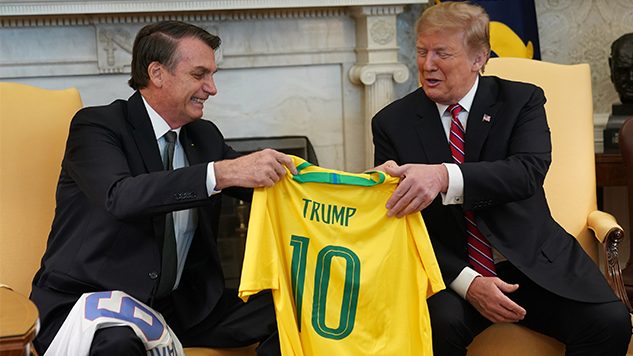Trump Says He’d Consider Making Brazil “Maybe a NATO Ally,” Likely Doesn’t Know How NATO Works
Photo by Pool/Getty
Oh, are we really surprised that President Donald Trump doesn’t know how NATO works? Not in the slightest. Do we need to report on it anyway because guess what—it’s literally his job to know how it works? Hell to the yes.
Bloomberg reports that during a joint news conference with Brazil’s President Jair Bolsonaro (a right-wing politician who espouses racist, misogynist and homophobic views), Trump said, “I also intend to designate Brazil as a major non-NATO ally, or even possibly—if you start thinking about it—maybe a NATO ally. I have to talk to a lot of people, but maybe a NATO ally.”
NATO is an acronym for North Atlantic Treaty Organization and it’s exactly what it sounds like—an alliance between European and North American countries. Clearly, Trump’s remarks on Tuesday show he either doesn’t know how continents work (honestly, not the biggest leap), doesn’t know how NATO works (very likely) or intends to radically change the nature of the alliance (which he would not be likely to achieve). Article 10 from the 1949 founding treaty stipulates that only European countries, the U.S. and Canada can join. In order for that central aspect of the alliance to change, Trump would need to convince all NATO member states to change Article 10, an unlikely event. Also, all members must approve of the country to be added. Besides the major problem of location, Bolsonaro’s far-right politics would not appeal to NATO allies such as France and Germany (our president, on the other hand, got very friendly with the Brazilian politician, known as the “Trump of the Tropics”).
The Washington Post’s Rick Noack points out that changing the fundamental geographic dynamic of NATO may be an important 21st-century update to the alliance, but that this likely wasn’t Trump’s intention at all in his comments:
To be fair, others have similarly suggested that it might be time to modify that part of the treaty and open the alliance to new members such as Australia, Japan and New Zealand. More than a decade ago, James M. Goldgeier, a fellow at the Council on Foreign Relations, wrote that adding new countries from outside Europe could be beneficial, “especially at a time when Europeans are having trouble meeting their own defense commitments.”
But unlike Trump, advocates of changing the founding treaty were arguing in favor of a stronger and emboldened NATO. The president has often appeared interested in achieving the opposite.
Indeed, Trump has often attacked the institution, even suggesting that the U.S. should pull out of the alliance. This would essentially destroy NATO, and play right into Putin’s hands. One of Trump’s primary criticisms of the alliance is that the U.S. spends more on defense than the other countries. NATO members are required to spend at least two percent of their GDP on defense and commit to aiding their allies if one is attacked. Many member states (not including the U.S., are you kidding me?) do not meet the former requirement, the Washington Post notes, but then again, neither does Brazil. It seems this may, at the very least, just be Trump’s attempt to find more occasions to rub elbows with his newest right-wing buddy or, more frighteningly, further empower the dangerous Bolsonaro.







































